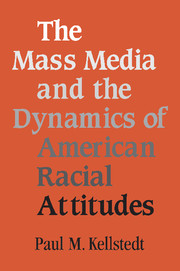Book contents
- Frontmatter
- Contents
- List of Figures
- List of Tables
- Preface
- The Mass Media and the Dynamics of American Racial Attitudes
- 1 Toward a Dynamic Perspective on Racial Attitudes
- 2 Eras of Media Coverage of Race
- 3 Eras of Racial Liberalism and Conservatism
- 4 Media Framing and the Dynamics of Racial Policy Preferences
- 5 The Fusion of Race and the Welfare State in the Public Mind
- 6 A New American Dilemma for a New Millennium?
- Appendix
- References
- Index
3 - Eras of Racial Liberalism and Conservatism
Published online by Cambridge University Press: 06 January 2010
- Frontmatter
- Contents
- List of Figures
- List of Tables
- Preface
- The Mass Media and the Dynamics of American Racial Attitudes
- 1 Toward a Dynamic Perspective on Racial Attitudes
- 2 Eras of Media Coverage of Race
- 3 Eras of Racial Liberalism and Conservatism
- 4 Media Framing and the Dynamics of Racial Policy Preferences
- 5 The Fusion of Race and the Welfare State in the Public Mind
- 6 A New American Dilemma for a New Millennium?
- Appendix
- References
- Index
Summary
People think about politics. Not often. Not systematically. But they do.
– James A. Stimson (1991)The disagreements between those who trace the origins of racial policy preferences to ideological commitments and those who trace them to the presence or absence of prejudice are strong and long-standing. But those disagreements are not total. Adherents of both perspectives have traditionally found common ground in the belief that racial policy preferences are stable. To be sure, this agreement stems from varying sources. Those whose explanation for racial attitudes focuses on prejudice may assume that racial policy preferences are stable because prejudice itself is resistant to change, and scholars emphasizing the role of ideology assume that the ideological commitments that drive racial policy preferences are similarly inertial. But despite the fact that they agree for disagreeable reasons, there has been scholarly consensus on the stability of racial policy preferences.
In fact, public-opinion researchers of all theoretical stripes have traditionally believed that racial policy preferences (along with political-party orientation) are among the most stable elements of a person's system of political beliefs. No other cluster of attitudes, it has been believed, approaches these two in terms of their lack of volatility. The spring from which all of this research flows is, again, the famous 1964 work of Philip Converse.
But just how stable are policy preferences on race? A close look at the data in this chapter will reveal considerable fluctuation over the past half-century.
- Type
- Chapter
- Information
- Publisher: Cambridge University PressPrint publication year: 2003



